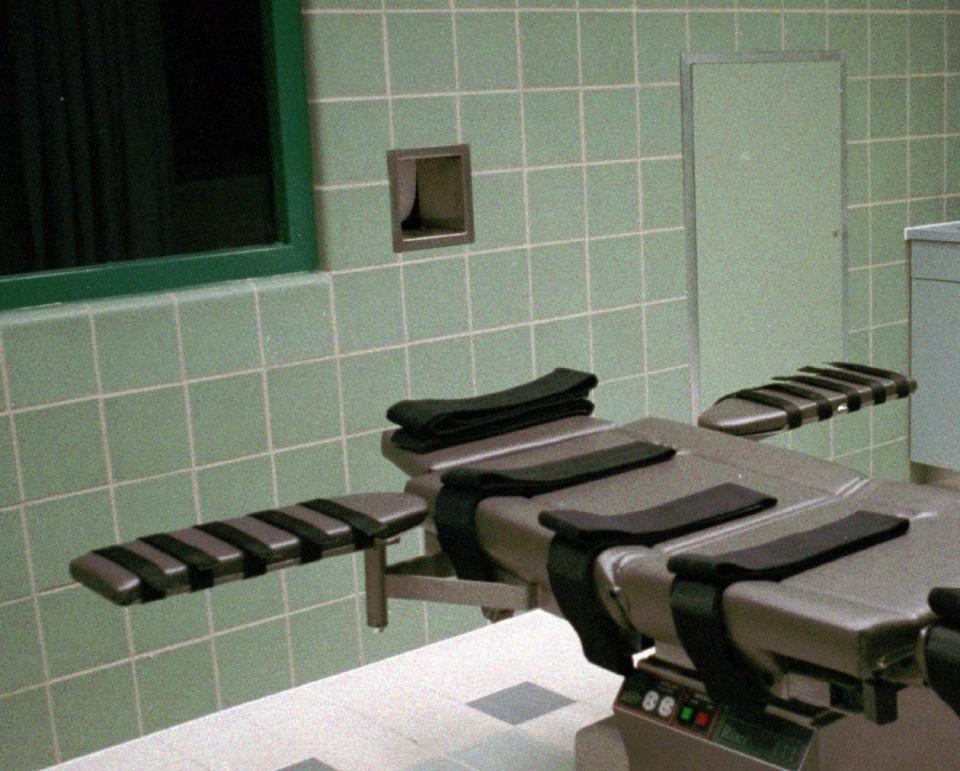Navajo man executed inside federal prison over tribal leaders’ objections
INDIANAPOLIS – Lezmond Mitchell was put to death Wednesday evening at the federal prison in Terre Haute, according to the Associated Press.
Mitchell, 38, was a member of the Navajo Nation and the only Native American on death row. He was convicted of killing 63-year-old Alyce Slim, and her 9-year-old granddaughter, Tiffany Lee, in Arizona in 2001.
Mitchell became the fourth prisoner to be executed in Terre Haute this year. Like the three executions before him, multiple appeals were made to stay or cancel the execution.
Also like the others, the appeals were unsuccessful.
On Sunday, Mitchell's attorneys asked the U.S. Supreme Court to halt his execution in a request that was denied Tuesday night. Attorneys also made one final request for clemency before President Donald Trump.
More: Scheduled federal execution of Navajo man raises sovereignty concerns
Attorneys said Mitchell's case is the only time in modern history the federal government has sought the death penalty over the objection of a tribe when the crime was committed on tribal land.
The Navajo Nation consistently objected to Mitchell's execution. Records from the Navajo Nation and Mitchell's attorneys show that Marlene Slim, Tiffany's mother and Alyce's daughter, also objected to prosecutors pursuing the death sentence at the time of the trial.
But attorneys representing Marlene as well as Tiffany's father, Daniel Lee, said in a statement on Wednesday that their clients' wishes relating to Mitchell's sentence have not been "accurately expressed."
Department of Justice spokeswoman Kerri Kupec said Wednesday that members of the victims' family attended the execution.
“Nearly 19 years after Lezmond Mitchell brutally ended the lives of two people, destroying the lives of many others, justice finally has been served," Kupec said.
"In attendance at the execution this evening were representatives of the victims’ families as well as the father of the 9-year-old girl that Mitchell murdered. Those family members, who are members of the Navajo Nation, have stated on the record that they supported implementation of the sentence returned by the jury and imposed by the court for Mitchell's horrific federal crimes.”

Mitchell's crimes
On Oct. 28, 2001, Mitchell and Johnny Orsinger, a minor at the time, traveled from Arizona to New Mexico. Mitchell was preparing for an armed robbery, and the two decided to hitchhike back to the Navajo reservation, according to court documents.
Slim and her granddaughter were traveling through New Mexico, and at some point on the trip, they picked up Mitchell and Orsinger.
Slim stopped to let the men out in Arizona, but they stabbed her 33 times. Court documents said the men made the child sit next to her grandmother's body, and Mitchell drove to the mountains before ordering the girl out of the truck.
Court documents said Mitchell cut the child's throat. When she did not die, Orsinger used rocks to kill her.
The issue of sovereignty
Mitchell was sentenced to death in 2003 after being convicted of carjacking resulting in death, murder, robbery and kidnapping. Orsinger, who as a juvenile was ineligible for the death penalty, pleaded guilty and was sentenced to life in prison.
Advocates across the country called on the federal government to stop Mitchell's execution because of sovereignty concerns related to the Navajo Nation.
The federal government didn't have any jurisdiction on tribal land until Congress passed the Major Crimes Act in 1885. With the passing of the Major Crimes Act, the government gained jurisdiction over certain crimes committed on tribal land by a Native American against another Native American.
More: Supreme Court clears way for federal executions to resume
In 1994, the Federal Death Penalty Act allowed tribal governments to say if they wanted the capital punishment to be applied to their citizens. The Navajo Nation is against the death penalty and told the federal government it did not want the death penalty to be pursued in Mitchell's case.
Federal executions resumed in Terre Haute in July after a 17-year hiatus. Daniel Lewis Lee was the first to be executed. Since then, Wesley Ira Purkey and Dustin Lee Honken have been executed.
Another man is scheduled to be executed two days after Mitchell. Keith Dwayne Nelson was convicted of kidnapping, raping and killing a 10-year-old girl in Missouri in 2001.
William Emmett LeCroy, who raped and murdered a woman in Georgia in 2001, is scheduled to be executed Sept. 22. Christopher Andre Vialva, who murdered two youth ministers in Texas in 1999, is scheduled for execution on Sept. 24.
Mack and Martin report for The Indianapolis Star, Castle reports for the Arizona Republic
Follow Justin L. Mack on Twitter: @justinlmack.
This article originally appeared on USA TODAY NETWORK: Lezmond Mitchell, only Native American on federal death row, executed
